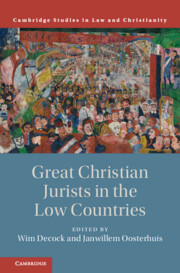Book contents
- Great Christian Jurists in the Low Countries
- Law and Christianity
- Great Christian Jurists in the Low Countries
- Copyright page
- Contents
- Contributors
- Introduction Law, Christianity, and Secularization in the Low Countries
- 1 Alger of Liège
- 2 Arnoldus Gheyloven
- 3 Boëtius Epo
- 4 Leonardus Lessius
- 5 Franciscus Zypaeus
- 6 Hugo Grotius
- 7 Paulus Voet
- 8 Ulrik Huber
- 9 Zeger-Bernard van Espen
- 10 Dionysius van der Keessel
- 11 Pieter Paulus
- 12 Guillaume Groen van Prinsterer
- 13 Edouard Ducpétiaux
- 14 Charles Périn
- 15 Léon de Lantsheere
- 16 Paul Scholten
- 17 Willem Duynstee
- 18 Jules Storme
- 19 Herman Dooyeweerd
- 20 Josse Mertens de Wilmars
- Index
- References
8 - Ulrik Huber
Published online by Cambridge University Press: 16 September 2021
- Great Christian Jurists in the Low Countries
- Law and Christianity
- Great Christian Jurists in the Low Countries
- Copyright page
- Contents
- Contributors
- Introduction Law, Christianity, and Secularization in the Low Countries
- 1 Alger of Liège
- 2 Arnoldus Gheyloven
- 3 Boëtius Epo
- 4 Leonardus Lessius
- 5 Franciscus Zypaeus
- 6 Hugo Grotius
- 7 Paulus Voet
- 8 Ulrik Huber
- 9 Zeger-Bernard van Espen
- 10 Dionysius van der Keessel
- 11 Pieter Paulus
- 12 Guillaume Groen van Prinsterer
- 13 Edouard Ducpétiaux
- 14 Charles Périn
- 15 Léon de Lantsheere
- 16 Paul Scholten
- 17 Willem Duynstee
- 18 Jules Storme
- 19 Herman Dooyeweerd
- 20 Josse Mertens de Wilmars
- Index
- References
Summary
Ulrik Huber was born in 1636 at Dokkum in Friesland as the sixth child of Zacharias Huber (c. 1601–1678), who was then a local notary (procureur). Zacharias’s father, Heinrich (or Hendrik, c. 1557–1641), was born in Altikon, a small village at the northern periphery of the canton Zürich. He came to the Low Countries during the Eighty Years War as a mercenary—according to Ulrik’s account, as ‘one of the vanguards of Dutch liberty and the Reformed Religion against the Spanish tyranny’. Heinrich’s military honour probably helped his resettlement in the Low Countries and his son Zacharias to marry a woman from the Frisian eigenerfden (proprietors) class, Sjoukje Jensma (c. 1603–1644), in 1626. Ulrik was born of this marriage. The political and social structure of Friesland was more democratic than that of other provinces of the Netherlands and it offered the extraordinarily talented boy a place to flourish. Ulrik climbed the ladder of society higher than any of his ancestors, eventually becoming a judge of Friesland’s highest court and one of the most renowned Dutch jurists of its Golden Age.
- Type
- Chapter
- Information
- Great Christian Jurists in the Low Countries , pp. 139 - 158Publisher: Cambridge University PressPrint publication year: 2021



